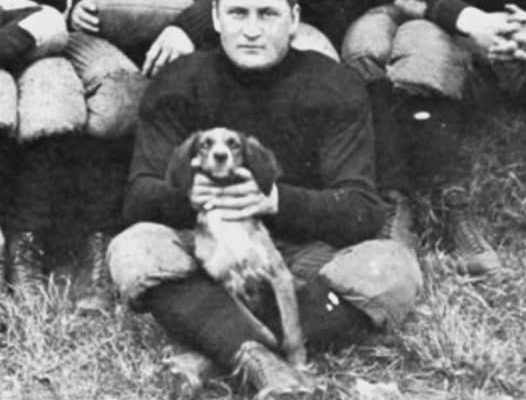Harold “War Eagle” Ketron remains a name woven deep into the foundational fabric of Georgia Bulldogs football history. Born on July 21, 1879, in the rugged valleys of Habersham County, Georgia, Ketron embodied the grit, pride, and toughness that would define the early days of UGA football. On this day, 146 years later, we look back not just at a name, but at a legend whose story is rich with Southern football folklore, fearless play, and an unwavering devotion to the red and black.
Ketron’s nickname, “War Eagle,” might puzzle those unfamiliar with his origin story. It wasn’t a nod to Auburn, as some may assume, but rather a ferocious battle cry that echoed throughout the hills of his childhood home. He and his brothers, known for their spirited tussles and spirited voices, adopted the call during their youthful melees, and Harold’s tenacity made the phrase stick. From a young age, “War Eagle” was more than a nickname—it was a warning, a statement of intent, a badge of pride. That fiery attitude would follow Ketron as he stepped onto the field at the University of Georgia in the early 1900s, bringing with him a brand of football as raw and intense as the Georgia wilderness he grew up in.
From 1901 to 1903, Ketron stood out as one of the Bulldogs’ premier players. Back then, football was a rough-and-tumble game, far from the polished and highly regulated sport we know today. Protective equipment was rudimentary, rules were still evolving, and the physical demands tested even the hardest men. Ketron thrived in this environment. By 1903, he had earned the respect of teammates and coaches alike, serving as the captain of that year’s squad. His leadership extended beyond play-calling or organizing drills—he was a force, an emotional and physical leader who set the tone with his attitude and example.
After 1903, Ketron took a two-year break from the game, but the call of the gridiron proved too strong. In 1906, he returned to Athens to once again don the Bulldogs uniform. This decision showcased not just his love for the game but also his deep commitment to Georgia football. It was rare during that time to see athletes return to college football after time away, especially with the physical and financial demands of early 20th-century life. But for Ketron, the Bulldogs were family, and Athens was home.
The stories that surround Ketron’s on-field demeanor only add to his legendary status. Known for playing with a rugged edge, one particular tale tells of Ketron spitting tobacco juice into an opponent’s eye before making a tackle. Whether apocryphal or not, the story reflects the raw, hard-nosed attitude that defined players of that era. These were not pampered athletes with personal chefs and recovery chambers—they were warriors in leather helmets, and Ketron was among the fiercest of them all.
However, Ketron’s impact on Georgia football extended far beyond his playing days. After graduating, he returned to the Bulldogs not just as an alumnus, but as a mentor and assistant coach. His football knowledge, leadership, and relentless passion made him an ideal figure to help mold the next generation of Georgia greats. But perhaps his most enduring contribution to the program came not through coaching schemes or practice drills, but through a recruitment effort that would change the course of Georgia football history forever.
It was Harold “War Eagle” Ketron who played a critical role in convincing Charley Trippi, a young phenom from the coal mining region of Pennsylvania, to bring his talents to Athens. Trippi, who would go on to become one of the most iconic players in college football history, was being courted by numerous programs across the country. But it was Ketron’s persistence, authenticity, and ability to connect with Trippi and his family that ultimately tipped the scales in Georgia’s favor.
Bringing Trippi to Athens wasn’t just a recruiting win—it was a seismic event for the program. Trippi led the Bulldogs to a national championship in 1942 and later returned from World War II to have another All-American season in 1946. He would become the No. 1 overall pick in the NFL Draft, earn a spot in both the College Football and Pro Football Halls of Fame, and represent the very best of what Georgia football could produce. And none of that may have happened without the influence and persistence of Ketron, who saw in Trippi a spark of greatness and did everything in his power to help bring it to life.
To truly understand Ketron’s impact, one must consider the era in which he lived and worked. College football in the early 1900s was not the commercialized powerhouse it is today. Resources were limited, travel was arduous, and exposure was minimal. It took men like Ketron—tough, dedicated, passionate individuals willing to give of themselves—to build programs from the ground up. Ketron’s work ethic and intensity reflected the values of the South during that time: loyalty, resilience, and a fierce sense of pride in one’s roots.
Today, UGA football enjoys national prominence, state-of-the-art facilities, and some of the best coaching and recruiting in the nation. But long before the titles, the Heisman finalists, or the massive crowds at Sanford Stadium, there were players like Harold Ketron who laid the foundation. He was not just a part of Georgia football history—he helped write its opening chapters.
It’s easy to get caught up in modern rankings, social media highlights, and five-star recruits. But every time a Bulldog walks into that locker room, every time “Glory, Glory” rings out after a touchdown, they are participating in a legacy forged by the sweat, grit, and heart of men like Ketron. His spirit, memorialized in the nickname “War Eagle,” lives on in the toughness Georgia players are expected to carry. It’s an intangible, but it’s there in the way a linebacker finishes a tackle, in the pride a captain takes wearing the “G,” and in the quiet resolve that defines Bulldog Nation.
Remembering Ketron today is more than a history lesson—it’s a tribute to the soul of Georgia football. He was the embodiment of a time when playing the game was about more than just wins and losses—it was about honor, loyalty, and giving your all for something bigger than yourself. That’s the legacy he leaves behind. In many ways, Ketron’s life reflects the purest version of college football—the version where heart mattered more than hype, where leadership was earned through toughness, and where the impact of one man could be felt for generations.
Harold “War Eagle” Ketron may have played in an era of grainy black-and-white photographs and leather helmets, but his legacy is full color. He blazed a trail in Athens that helped build one of the most respected programs in college football. From his childhood cries in the hills of Habersham to his fiery play on the field, to his mentorship and recruiting brilliance as a coach, Ketron’s story is as essential to UGA history as any championship banner.
On what would be his 146th birthday, the Bulldog faithful owe a moment of reflection and gratitude to this rugged trailblazer. He was more than just a player, more than a coach—he was the embodiment of Georgia football before the world knew what that truly meant. Harold Ketron’s name might not appear on the highlight reels or in the modern recruiting rankings, but his fingerprint is etched into the DNA of the program. Every time Georgia players take the field with fire in their bellies and pride in their hearts, they carry with them a little piece of “War Eagle.” And that, perhaps, is the greatest tribute of all.



